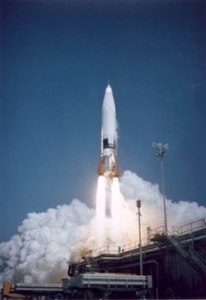
A rocket or rocket vehicle is a missile, spacecraft, aircraft or other vehicle which obtains thrust from a rocket engine. In all rockets, the exhaust is formed entirely from propellants carried within the rocket before use. Rocket engines work by action and reaction. Rocket engines push rockets forwards simply by throwing their exhaust backwards extremely fast.
Rockets, in military and recreational uses, date back to at least the 13th century. Significant scientific, interplanetary and industrial use did not occur until the 20th century, when rocketry was the enabling technology of the Space Age, including setting foot on the moon.
Rockets are used for fireworks, weaponry, ejection seats, launch vehicles for artificial satellites, human spaceflight and exploration of other planets. While comparatively inefficient for low speed use, they are very lightweight and powerful, capable of generating large accelerations and of attaining extremely high speeds with reasonable efficiency.
A nuclear weapon is an explosive device that derives its destructive force from nuclear reactions, either fission or a combination of fission and fusion. Both reactions release vast quantities of energy from relatively small amounts of matter; a modern thermonuclear weapon weighing little more than a thousand kilograms can produce an explosion comparable to the detonation of more than a billion kilograms of conventional high explosive.
Thus, even single small nuclear devices no larger than traditional bombs can devastate an entire city by blast, fire and radiation. Nuclear weapons are considered weapons of mass destruction, and their use and control has been a major focus of international relations policy since their debut.